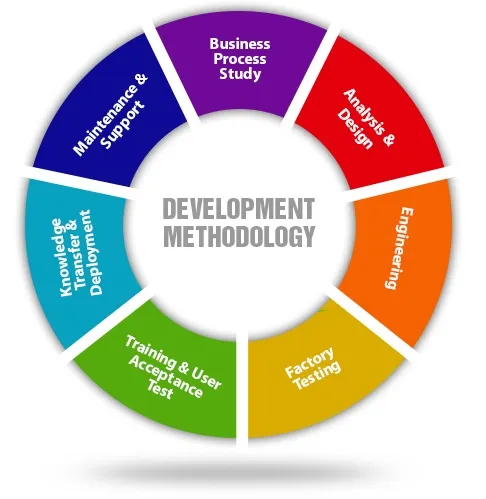Choosing the right software development methodology is crucial for the success of any enterprise software project. With several options to choose from, it can be tough to know which one is right for your team.
Hence, it’s important to consider the specific needs of your project. This article will explore some of the most popular software development methodologies and offer tips and tricks for choosing the right one for your project.
Software Development Methodologies: A Brief
Software development methodologies are rules, guidelines, and procedures that you follow as part of the software development process to ensure you can create quality code on schedule and budget. Enterprise software development methodology is constantly evolving.
Let’s Have A Quick Look At The Latest Statistics
The average Enterprise software development project takes 18 months to complete.
- As per Business Intelligence Market, only 29% of Enterprise software development projects are considered successful.
- According to CIO, 71% of Enterprise software development projects are delayed, over budget, or both. The most common Enterprise software development methodology is the waterfall model.
- Agile methodology is gaining popularity, with 61% of Enterprise software developers saying they use agile methods.
- As per the Infoworld survey, the top three Enterprise Software Development challenges are requirements gathering (38%), integration (36%), and testing (34%).
Why Do Businesses Need Software Development Methodology?
To be productive and successful in your business, you need to know exactly what you want to accomplish and how you plan to do it. Without clear goals and a concrete plan, it’s easy to lose focus, which results in wasted time and resources.
Img src: Google
Luckily, software development methodologies can help you create this framework that will keep you on track throughout the project’s lifetime. Here we have elaborated on the reasons why your business needs software development methodologies:
1) To Make Sure Everyone Is On The Same Page
When a team is creating software, all members must have a common understanding of how things will be done. For example, if you’re working on a project intended to process transactions as fast as possible, everyone needs to know what as fast as possible means.
To ensure team members understand their roles and responsibilities, they should be provided with detailed requirements and objectives that outline project specifics.
2) To Ensure There Are No Miscommunications
Communication acts as a two-way street: as much as you want your team to understand what you want, you also need to understand what they need. To get their input, ask open-ended questions that don’t force them into yes/no answers; ask what if? Questions that leave room for multiple scenarios; and brainstorming together. Don’t be afraid to give constructive criticism, too—the best solutions are often created through an iterative process.
3) To Make Sure You Deliver What You Promise To Your Customers
All too often, businesses fail to deliver what they promise to their customers. In many cases, companies don’t start with a clear roadmap of what they need to do. By developing a methodology for software development, you can create an organized and consistent approach for building your product or service.
4) To Help You Avoid Costly Mistakes
Software development methodologies provide a set of rules for development, which are documented and enforced. They help you create easy-to-read and test code, ensuring accuracy and consistency. They also let you work with your team members in an organized way, minimizing duplication of effort.
These things can help prevent costly errors that would otherwise arise throughout software creation. You don’t want bugs to make it into production—it’s simply not good for business!
5) To Ensure You Meet Deadlines
A deadline is a must when it comes to software development. If you don’t have set deadlines for your project, it could easily be delayed and never finished. Deadlines not only force action but also help you stay on track by giving you something to aim for and get excited about.
Moreover, they provide clarity of purpose: When everyone knows what they need to accomplish within a given time frame, there’s no question about what needs to be done.
Example: A software development company uses an agile methodology, emphasizing fast-paced and continual innovation within each project’s time limit. Agile projects are organized in smaller timeboxes called sprints, each with a specific goal.
6) To Promote Collaboration
A good methodology will encourage collaboration between different teams and individuals, improving communication and ensuring that everyone is working towards the same goal.
7) To Increase Customer Satisfaction
By using a methodology that focuses on quality and efficiency, you can help to increase customer satisfaction with your software. This can lead to more repetitive business and improved brand loyalty.
Also Read: A Comprehensive Guide on Software Development
The Curated List Of Top Software Development Methodologies For Enterprises
1. Waterfall Methodology
In waterfall methodologies, every step or goal needs to be met before moving on to the next part. For example – if you have five tasks that need to be completed but only three are done while one is left undone, the project can’t continue until it’s been completed.
This system has several pros compared to other ones out there- for instance, it doesn’t require too much thinking and planning, which helps save time, and because it has steps laid out beforehand, there’s less room for error.
The main advantage of the waterfall model is its predictability. Because each stage is completed before moving on to the next, tracking progress and identifying potential problems early on is easy.
The main downside of the waterfall model is its inflexibility. Once a stage of the process has begun, it’s difficult to make changes without starting the whole process over again from the beginning.
A spiral methodology is also called waterfall because it follows a linear pattern without backtracking. Unlike its predecessor, though- it offers more flexibility in prototyping so that we can test new ideas earlier on in the process instead of making costly mistakes later on during the development stages.
Pros
- The phases (generally described as Requirements, Design, Implementation, Verification, and Maintenance) are easy to understand and manage.
- Ideal for less experienced teams and managers as confusion is minimized.
- Simple rigid model keeps things clear and easy to test.
- A significant amount of time is saved.
Cons
- Only focuses on precise needs.
- Does not work well for maintenance software development projects or long-term projects.
- There is no way to know the project’s outcome in advance.
2. Rapid App Development Methodology
Rapid Application Development provides an ideal way to take maximum advantage of software with minimal investment costs. This condensed model allows quick adjustments that speed up results, and you repeat user design/construction phases until project requirements finish (stages include: requirements planning; construction).
However, there’s no need to go back through all four again once something has been changed in one stage.
Pros
- More useful for projects with well-defined objectives and user groups.
- Best for small to medium, time-sensitive projects.
- Facilitates the development process by developing high-quality projects faster.
- Take customer feedback for improvements and specific results.
Cons
- A stable team with experienced developers need for this methodology to work.
- Requires highly skilled developers to design complex problems.
- Does not work for small budgets.
3. Agile Methodology
This methodology makes it possible to develop software by working in small increments called iterations. It helps improve efficiency because you can find problems early on and fix them before they become bigger issues later.
It is known as “reducing risk” or reducing uncertainty, among other things, through testing scenarios during each stage of development (user stories).
The main pros of agile software development is its flexibility. Because teams can adjust their plans, agile methodology is best for projects with rapidly changing requirements.
The main disadvantage of agile software development is that it is difficult to track progress and estimate deadlines since the project’s scope may change during the development process.
Pros
- The model adapts to changes quickly.
- Direct and regular communication maintains clarity about the project and goals.
- Defects and differences in expectations are detected early, so they can be corrected before they become significant problems.
Cons
- Focusing on the details and losing sight of the “big picture” can cause the project to drift.
- Real-time communication requires massive engagement with users and colossal manpower investment on the part of developers.
- May not work for larger organizations (a hybrid approach with another methodology may be useful).
4. DevOps Deployment Methodology
DevOps deployment methodology is a game-changing approach that improves all aspects of project management. It has been proven to lower the time it takes for projects and software releases, reduce failure rates overall as well as help developers be more efficient with their work producing better results in less amount of downtime or wasted resources.
Pros
- Significantly reduces time to market.
- Improves customer satisfaction and product quality.
- Increases productivity and efficiency of employees.
Cons
- May require ongoing system updates that customers do not want.
- DevOps may not work for some industries that need testing before moving to operations.
- When working with departments, some undetected problems may go unnoticed.
Also Read: Why The Involvement Of DevOps In The Business Process Is Important?
Have A Look At The Infographic: A Brief Of The Above Points
Benefits Of Using Software Development Methodologies
There’s no question that software development methodologies can be extremely beneficial for enterprises. By following a set of best practices, enterprises can ensure that their software development projects are more efficient, organized, and successful.
Here we have listed the main benefits of using software development methodologies:
-
Improved efficiency
When software development projects are properly organized and managed, they tend to be more efficient. This means that enterprises can get their products to market faster and save money in the long run.
-
Greater accuracy
Using a software development methodology can help reduce errors and improve the overall quality of the final product. By following best practices, enterprises can avoid costly mistakes and deliver a product that meets customer expectations.
-
Better communication
Methodologies can help improve communication between all stakeholders in a software development project. By having a clear plan and well-defined roles, everyone involved will know what their responsibilities are. This can help reduce confusion and conflict and make the project run more smoothly.
-
Increased transparency
When enterprises use software development methodologies, they can provide greater transparency into the project for all stakeholders. This can help build trust & confidence in the enterprise and keep everyone on the same page.
Overall, using software development methodologies can be extremely beneficial for enterprises. By following best practices, enterprises can improve the efficiency, accuracy, and communication of their software development projects. Additionally, using methodologies can help increase transparency and build trust with all stakeholders.
No matter which software development methodology you choose, there are some general tips and tricks that can help ensure your project’s success:
- Define your objectives early on and be sure everyone involves in the project understands them.
- Create detailed plans for each stage of the software development process.
- Make sure you have a clear idea of who is responsible for each task and when it needs to complete.
- Establish regular checkpoints throughout the project to track progress and identify potential problems.
- Prepare yourself to adjust your plans as the project progresses. Unexpected changes are inevitable in any software development project, so it’s important to be flexible and adaptable.
The above tips would surely help in ensuring that your software development project is successful, no matter which methodology you choose.
What does The Future Hold for Advanced Software Development Methodologies?
The future of software development is looking bright, with several advanced methodologies set to take the industry by storm. Hence, we can expect to see more of the following:
Collaboration between developers and other stakeholders
To create successful applications, it’s important to understand the needs of those who will be using them. It means that developers will need to work closely with other stakeholders, such as product managers, designers, and user experience experts.
Focus on automation
Automation is key to efficiency in software development. By automating tasks like build processes and testing, developers can free up time to focus on more important tasks.
Emphasis on delivering value to users quickly
In today’s fast-paced world, users expect to regularly see new features and updates. It means that developers need to be able to deliver value quickly without sacrificing quality.
Also read: Staying Ahead in Enterprise Software: Latest Trends and Technologies
Advanced Software Development Methodologies
The software development landscape is constantly evolving. New methodologies comes, and old ones refine.
Here are just a few of the exciting new approaches that developers will be using in the years to come:
Model-based design
This methodology focuses on creating visual models of software systems, which can then use to generate code automatically. Hence, this approach can lead to more efficient and accurate development and a better understanding of complex systems.
Component-based development
This methodology takes a modular approach to software development, building individual components that can reuse in different applications. It can save time and money during the development process and make it easier to maintain and update software systems.
Agile development
This iterative approach to software development is more flexible and responsive to changes, making it ideal for rapidly evolving projects. Also, agile methods can also help improve communication and collaboration between developers and other stakeholders.
DevOps approach
This methodology emphasizes collaboration between developers and operations teams. It helps in speeding up the software development process by making it more efficient and streamlined.
Behavior Driven Development
BDD aims to make it easier for businesses and skilled developers to understand what to develop. Using a language you choose (e.g., Gherkin), BDD lets you write what your app should do before writing any code. It makes your specifications clearer, so there’s less back-and-forth between business and engineering teams later on.
Conclusion
So, which software development methodology is right for your business? Hopefully, this article has given you a good starting point and some ideas on what to consider when making your decision.
Always remember that the best methodology is the one that fits your company’s culture, processes, and goals. Hence, you can even try to experiment with different methodologies until you find the one that works best for you.
In my opinion, if you’re working on a large, complex project with ever-changing requirements, the agile methodology can be the right choice for you. However, waterfall may be a better option if you’re working on a small, predictable project with well-defined requirements.
Moreover, you need to keep an eye out for new developments and prepare to adapt as needed. For any query, you can always consult with our expert software developers at ValueCoders. We have been a leading software development company in India since 2004.








